| Listing 1 - 10 of 10 |
Sort by
|
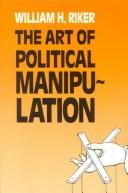
ISBN: 0300035926 Year: 1986 Publisher: New Haven, Conn. Yale University Press
Abstract | Keywords | Export | Availability | Bookmark
 Loading...
Loading...Choose an application
- Reference Manager
- EndNote
- RefWorks (Direct export to RefWorks)
Politics --- #C9206 --- Games of strategy (Mathematics) --- Political leadership. --- Political planning. --- Games of strategy (Mathematics). --- Political leadership --- Political planning --- Games with rational pay-off (Mathematics) --- Rational games (Mathematics) --- Strategy, Games of (Mathematics) --- Planning in politics --- Public policy --- Game theory --- Group theory --- Mathematical optimization --- Matrices --- Topology --- Planning --- Policy sciences --- Politics, Practical --- Public administration --- Leadership
Book
ISBN: 0124023568 9786612289491 1282289497 0080955436 9780080955438 9780124023567 9781282289499 661228949X Year: 1973 Volume: 36 Publisher: New York (N.Y.): Academic press
Abstract | Keywords | Export | Availability | Bookmark
 Loading...
Loading...Choose an application
- Reference Manager
- EndNote
- RefWorks (Direct export to RefWorks)
Graphs, Dynamic Programming and Finite Games
Graph theory --- Games of strategy (Mathematics) --- Programming (Mathematics) --- 519.8 --- Operational research --- 519.8 Operational research --- Graph theory. --- Mathematical programming --- Goal programming --- Algorithms --- Functional equations --- Mathematical optimization --- Operations research --- Graphs, Theory of --- Theory of graphs --- Combinatorial analysis --- Topology --- Games with rational pay-off (Mathematics) --- Rational games (Mathematics) --- Strategy, Games of (Mathematics) --- Game theory --- Group theory --- Matrices --- Extremal problems
Book
ISBN: 9781107011748 1107011744 9780511996450 9781107428980 9781139224420 9781139220996 1139220993 1139224425 0511996454 1139217917 9781139217910 1107228905 9781107228900 1280485159 9781280485152 9786613580139 6613580139 1139222716 9781139222716 1139214829 9781139214827 110742898X Year: 2012 Publisher: New York : Cambridge University Press,
Abstract | Keywords | Export | Availability | Bookmark
 Loading...
Loading...Choose an application
- Reference Manager
- EndNote
- RefWorks (Direct export to RefWorks)
Game theory explains how to make good choices when different decision makers have conflicting interests. The classical approach assumes that decision makers are committed to making the best choices for themselves regardless of the effect on others, but such an approach is less appropriate when cooperation, compromise and negotiation are important. This book describes conditional games, a form of game theory that accommodates multiple stakeholder decision-making scenarios where cooperation and negotiation are significant issues and where notions of concordant group behavior are important. Using classical binary preference relations as a point of departure, the book extends the concept of a preference ordering that permits stakeholders to modulate their preferences as functions of the preferences of others. As these conditional preferences propagate through a group of decision makers, they create social bonds that lead to notions of group concordance. This book is intended for all students and researchers of decision theory and game theory.
Operational research. Game theory --- Decision Making --- Games of strategy (Mathematics) --- Decision making. --- Basic Sciences. Mathematics --- Applied Mathematics --- Games of strategy (Mathematics). --- Applied Mathematics. --- Decision making --- Games with rational pay-off (Mathematics) --- Rational games (Mathematics) --- Strategy, Games of (Mathematics) --- Game theory --- Group theory --- Mathematical optimization --- Matrices --- Topology --- Deciding --- Decision (Psychology) --- Decision analysis --- Decision processes --- Making decisions --- Management --- Management decisions --- Choice (Psychology) --- Problem solving --- Information Technology --- Computer Science (Hardware & Networks)
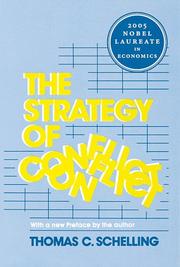
ISBN: 0674840313 9780674840317 Year: 1994 Publisher: Cambridge (Mass.) : Harvard university,
Abstract | Keywords | Export | Availability | Bookmark
 Loading...
Loading...Choose an application
- Reference Manager
- EndNote
- RefWorks (Direct export to RefWorks)
Game theory --- Negotiation --- Games of strategy (Mathematics) --- 158 --- Games with rational pay-off (Mathematics) --- Rational games (Mathematics) --- Strategy, Games of (Mathematics) --- Group theory --- Mathematical optimization --- Matrices --- Topology --- Bargaining --- Dickering --- Haggling --- Higgling --- Negotiating --- Negotiations --- Discussion --- Psychology, Applied --- Games, Theory of --- Theory of games --- Mathematical models --- Mathematics --- Jeux de stratégie (Mathématiques) --- S2007412.JPG --- Internationale conflicten. Internationale spanningen. Internationale blokvorming. Veiligheidspolitiek --- 327.5 Internationale conflicten. Internationale spanningen. Internationale blokvorming. Veiligheidspolitiek --- International relations. Foreign policy --- Polemology --- 327.5 --- internationale verhoudingen --- 327 --- Conflict management
Book
ISBN: 3030244555 3030244547 Year: 2019 Publisher: Cham : Springer International Publishing : Imprint: Springer,
Abstract | Keywords | Export | Availability | Bookmark
 Loading...
Loading...Choose an application
- Reference Manager
- EndNote
- RefWorks (Direct export to RefWorks)
This book provides a state-of-the-art overview on the dynamics and coevolution in multi-level strategic interaction games. As such it summarizes the results of the European CONGAS project, which developed new mathematical models and tools for the analysis, prediction and control of dynamical processes in systems possessing a rich multi-level structure and a web of interwoven interactions among elements with autonomous decision-making capabilities. The framework is built around game theoretical concepts, in particular evolutionary and multi-resolution games, and includes also techniques drawn from graph theory, statistical mechanics, control and optimization theory. Specific attention is devoted to systems that are prone to intermittency and catastrophic events due to the effect of collective dynamics.
Games of strategy (Mathematics) --- Games with rational pay-off (Mathematics) --- Rational games (Mathematics) --- Strategy, Games of (Mathematics) --- Game theory --- Group theory --- Mathematical optimization --- Matrices --- Topology --- System theory. --- Sociophysics. --- Econophysics. --- Computational complexity. --- Game theory. --- Complex Systems. --- Data-driven Science, Modeling and Theory Building. --- Complexity. --- Game Theory. --- Games, Theory of --- Theory of games --- Mathematical models --- Mathematics --- Complexity, Computational --- Electronic data processing --- Machine theory --- Economics --- Statistical physics --- Mathematical sociology --- Systems, Theory of --- Systems science --- Science --- Statistical methods --- Philosophy
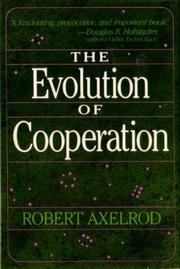
ISBN: 0465021212 0465021220 9780465021222 9780465021215 Year: 1984 Publisher: New York: Basic books,
Abstract | Keywords | Export | Availability | Bookmark
 Loading...
Loading...Choose an application
- Reference Manager
- EndNote
- RefWorks (Direct export to RefWorks)
Social ethics --- Cooperativeness --- Games of strategy (Mathematics) --- Conflict management --- Egoïsm --- Consensus (Social sciences) --- Social interaction --- Coopération (Psychologie) --- Jeux de strategie (Mathematiques) --- Gestion des conflits --- Égoïsme --- Consensus (Sciences sociales) --- Interaction sociale --- Egoism --- Coopération --- --Individu --- --Société --- --Prisoner's dilemma game --- 338.22 --- Prisoner's dilemma game --- Human interaction --- Interaction, Social --- Symbolic interaction --- Exchange theory (Sociology) --- Psychology --- Social psychology --- Decomposed prisoner's dilemma game --- Choice (Psychology) --- Games with rational pay-off (Mathematics) --- Rational games (Mathematics) --- Strategy, Games of (Mathematics) --- Game theory --- Group theory --- Mathematical optimization --- Matrices --- Topology --- Egocentricity --- Philosophy --- Self-interest --- Authority --- Common good --- General will --- Power (Social sciences) --- Conflict control --- Conflict resolution --- Dispute settlement --- Management of conflict --- Managing conflict --- Management --- Negotiation --- Problem solving --- Social conflict --- Crisis management --- Cooperation (Psychology) --- Economische organisatieleer. Economisch beleid. Economische politiek --- Conflict management. --- Cooperativeness. --- Egoism. --- Prisoner's dilemma game. --- Social interaction. --- Consensus (Social sciences). --- Games of strategy (Mathematics). --- 338.22 Economische organisatieleer. Economisch beleid. Economische politiek --- Individu --- Société
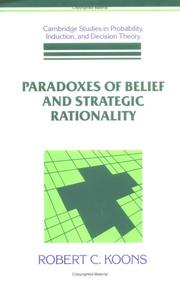
ISBN: 0521412692 0521100593 0511625383 Year: 1992 Publisher: Cambridge : Cambridge university press,
Abstract | Keywords | Export | Availability | Bookmark
 Loading...
Loading...Choose an application
- Reference Manager
- EndNote
- RefWorks (Direct export to RefWorks)
This book develops a framework for analysing strategic rationality, a notion central to contemporary game theory, which is the formal study of the interaction of rational agents and which has proved extremely fruitful in economics, political theory and business management. The author argues that a logical paradox lies at the root of a number of persistent puzzles in game theory, in particular those concerning rational agents who seek to establish some kind of reputation. Building on the work of Parsons, Burge, Gaifman and Barwise and Etchemendy, Robert Koons constructs a context-sensitive solution to the whole family of liar-like paradoxes including, for the first time, a detailed account of how the interpretation of paradoxical statements is fixed by context. This analysis provides an understanding of how the rational agent model can account for the emergence of rules, practices and institutions.
Business policy --- Belief and doubt --- Games of strategy (Mathematics) --- Liar paradox --- Croyance et doute --- Jeux de stratégie (Mathématiques) --- Paradoxe du menteur --- Théorie des jeux --- Rationalité --- Jeux de stratégie (mathématiques) --- Liar paradox. --- Belief and doubt. --- Antinomy of the liar --- Epimenidean paradox --- Liar antinomy --- Paradox of Epimenides --- Paradox of Russell --- Paradox of the liar --- Russell's paradox --- Logic --- Paradox --- Semantics (Philosophy) --- Games with rational pay-off (Mathematics) --- Rational games (Mathematics) --- Strategy, Games of (Mathematics) --- Game theory --- Group theory --- Mathematical optimization --- Matrices --- Topology --- Conviction --- Doubt --- Consciousness --- Credulity --- Emotions --- Knowledge, Theory of --- Philosophy --- Psychology --- Religion --- Will --- Agnosticism --- Rationalism --- Skepticism --- Games of strategy (Mathematics). --- Jeux de stratégie (Mathématiques) --- Paradoxe du menteur. --- Théorie des jeux. --- Rationalité. --- Arts and Humanities --- Théorie des jeux. --- Rationalité. --- Jeux de stratégie (mathématiques)

ISBN: 0140124950 9780140124958 Year: 1990 Publisher: London: Penguin books,
Abstract | Keywords | Export | Availability | Bookmark
 Loading...
Loading...Choose an application
- Reference Manager
- EndNote
- RefWorks (Direct export to RefWorks)
Cooperativeness --- Games of strategy (Mathematics) --- Conflict management --- Egoïsm --- Consensus (Social sciences) --- Social interaction --- Coopération (Psychologie) --- Jeux de strategie (Mathematiques) --- Gestion des conflits --- Égoïsme --- Consensus (Sciences sociales) --- Interaction sociale --- Egoism --- Coopération --- --Individu --- --Société --- --Prisoner's dilemma game --- #SBIB:35H006 --- #SBIB:327.1H20 --- #SBIB:IO --- Human interaction --- Interaction, Social --- Symbolic interaction --- Exchange theory (Sociology) --- Psychology --- Social psychology --- Authority --- Common good --- General will --- Power (Social sciences) --- Egocentricity --- Philosophy --- Self-interest --- Conflict control --- Conflict resolution --- Dispute settlement --- Management of conflict --- Managing conflict --- Management --- Negotiation --- Problem solving --- Social conflict --- Crisis management --- Games with rational pay-off (Mathematics) --- Rational games (Mathematics) --- Strategy, Games of (Mathematics) --- Game theory --- Group theory --- Mathematical optimization --- Matrices --- Topology --- Cooperation (Psychology) --- Bestuurswetenschappen: theorieën --- Sociologie van de internationale betrekkingen: algemeen --- Conflict management. --- Cooperativeness. --- Egoism. --- Social interaction. --- Consensus (Social sciences). --- Games of strategy (Mathematics). --- Individu --- Société --- Prisoner's dilemma game --- Social ethics --- Statistical physics
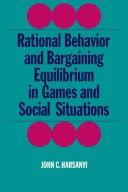
ISBN: 0521208866 0521311837 0511571755 0511864868 9780521208864 9780521311830 9780511571756 Year: 1988 Publisher: Cambridge: Cambridge university press,
Abstract | Keywords | Export | Availability | Bookmark
 Loading...
Loading...Choose an application
- Reference Manager
- EndNote
- RefWorks (Direct export to RefWorks)
This is a paperback edition of a major contribution to the field, first published in hard covers in 1977. The book outlines a general theory of rational behaviour consisting of individual decision theory, ethics, and game theory as its main branches. Decision theory deals with a rational pursuit of individual utility; ethics with a rational pursuit of the common interests of society; and game theory with an interaction of two or more rational individuals, each pursuing his own interests in a rational manner.
Mathematical statistics --- Social psychology --- Game theory --- Decision making --- Games of strategy (Mathematics) --- Social interaction --- Théorie des jeux --- Prise de décision --- Jeux de stratégie (Mathématiques) --- Mathematical models --- Modèles mathématiques --- Decision Making --- 316.454.4 --- -Decision making --- -Deciding --- Decision (Psychology) --- Decision analysis --- Decision processes --- Making decisions --- Management --- Management decisions --- Choice (Psychology) --- Problem solving --- Human interaction --- Interaction, Social --- Symbolic interaction --- Exchange theory (Sociology) --- Psychology --- Games with rational pay-off (Mathematics) --- Rational games (Mathematics) --- Strategy, Games of (Mathematics) --- Group theory --- Mathematical optimization --- Matrices --- Topology --- Games, Theory of --- Theory of games --- Mathematics --- Cohesie. Groepsbinding. Integratie. Teamgeest --- Game theory. --- Mathematical models. --- Games of strategy (Mathematics). --- -Cohesie. Groepsbinding. Integratie. Teamgeest --- 316.454.4 Cohesie. Groepsbinding. Integratie. Teamgeest --- -Games with rational pay-off (Mathematics) --- Deciding --- Théorie des jeux --- Prise de décision --- Jeux de stratégie (Mathématiques) --- Modèles mathématiques --- Business, Economy and Management --- Economics --- Decision Making - Mathematical models --- Social interaction - Mathematical models --- 330.1 --- 330.1 Economische grondbegrippen. Algemene begrippen in de economie --- Economische grondbegrippen. Algemene begrippen in de economie
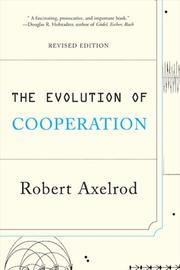
ISBN: 9780465005642 0465005640 Year: 2006 Publisher: New York : Basic Books,
Abstract | Keywords | Export | Availability | Bookmark
 Loading...
Loading...Choose an application
- Reference Manager
- EndNote
- RefWorks (Direct export to RefWorks)
'The Evolution of Cooperation' provides valuable insights into the age-old question of whether unforced cooperation is ever possible. Widely praised and much-discussed, this classic book explores how cooperation can emerge in a world of self-seeking egoists-whether superpowers, businesses, or individuals-when there is no central authority to police their actions. The problem of cooperation is central to many different fields. Robert Axelrod recounts the famous computer tournaments in which the & cooperative& program Tit for Tat recorded its stunning victories, explains its application to a broad spectrum of subjects, and suggests how readers can both apply cooperative principles to their own lives and teach cooperative principles to others.
856.3 Conflictbemiddeling --- 823 Diplomatie --- Conflict management. --- Consensus (Social sciences) --- Cooperativeness. --- Egoism. --- Games of strategy (Mathematics) --- Prisoner's dilemma game. --- Social groups. --- Social interaction. --- Social psychology. --- Consenso (Ciencias sociales). --- Cooperación (Psicología). --- Cooperación (Psicología). --- Dilema del prisionero, Juego. --- Egoísmo. --- Egoísmo. --- Interacción social. --- Interacción social. --- Juegos de estrategia (Matemáticas). --- Juegos de estrategia (Matemáticas). --- Solución de conflictos. --- Solución de conflictos. --- Consensus (Social sciences). --- Games of strategy (Mathematics). --- Conflict management --- Cooperativeness --- Egoism --- Prisoner's dilemma game --- Social groups --- Social interaction --- Social psychology --- 856.3 Conflictbemiddeling/Onderhandelingstechnieken --- Authority --- Common good --- General will --- Power (Social sciences) --- Mass psychology --- Psychology, Social --- Human ecology --- Psychology --- Sociology --- Conflict control --- Conflict resolution --- Dispute settlement --- Management of conflict --- Managing conflict --- Management --- Negotiation --- Problem solving --- Social conflict --- Crisis management --- Human interaction --- Interaction, Social --- Symbolic interaction --- Exchange theory (Sociology) --- Association --- Group dynamics --- Groups, Social --- Associations, institutions, etc. --- Social participation --- Decomposed prisoner's dilemma game --- Choice (Psychology) --- Games with rational pay-off (Mathematics) --- Rational games (Mathematics) --- Strategy, Games of (Mathematics) --- Game theory --- Group theory --- Mathematical optimization --- Matrices --- Topology --- Egocentricity --- Philosophy --- Self-interest --- Cooperation (Psychology) --- Coopération (psychologie) --- Interaction sociale. --- Consensus (sciences sociales) --- Coopération (psychologie)
| Listing 1 - 10 of 10 |
Sort by
|

 Search
Search Feedback
Feedback About UniCat
About UniCat  Help
Help News
News